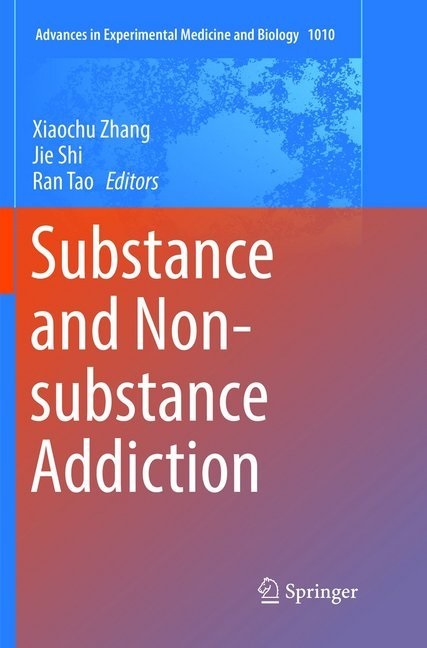Read more
This book focuses on the similarities and differences between substance and non-substance addictions. It discusses in detail the mechanisms, diagnosis and treatment of substance and non-substance addictions, and addresses selected prospects that will shape future studies on addiction. Addiction is a global problem that costs millions of lives tremendous damage year after year. There are mainly two types of addition: substance addiction (e.g., nicotine, alcohol, cannabis, heroin, stimulants, etc.) and non-substance addiction (e.g., gambling, computer gaming, Internet, etc.). Based on existing evidence, both types of addiction produce negative impacts on individuals' physical, mental, social and financial well-being, and share certain common mechanisms, which involve a dysfunction of the neural reward system and specific gene transcription factors. However, there are also key differences between these two types of addiction. Covering these aspects systematically, the book will provideresearchers and graduate students alike a better understanding of drug and behavioral addictions.
List of contents
Received view of addiction, relapse and treatment.- Definition of substance and non-substance addictions.- Similarities and differences in molecule and neural circuit of substance and non-substance addictions.- Similarities and differences in genetics of substance and non-substance addictions.- Similarities and differences in neuroimaging of substance and non-substance addictions.- Similarities and differences in cognitive psychology of substance and non-substance addictions.- Similarities and differences in diagnostic criterion of substance and non-substance addictions.- Similarities and differences in diagnostic scales of substance and non-substance addictions.- Similarities and differences in biochemical diagnosis of substance and non-substance addictions.- Development of new diagnostic techniques of substance and non-substance addictions.- Drug therapy for substance and non-substance addictions.- Physical therapy for substance and non-substance addictions.- Traditional Chinese medical therapy for substance and non-substance addictions.- Nutrition support therapy for substance and non-substance addictions.- Psychotherapy for substance and non-substance addictions.- Cognitive-behavioural therapy for substance and non-substance addictions.- Summary and prospect.
About the author
Dr. Xiaochu Zhang is a professor at the School of Life Sciences, University of Science and Technology of China, and a principal investigator at the Cognitive Neuropsychology Lab. His research focuses on the neural basis of drug and behavior addiction and its applications to addiction treatment. He has published more than 30 articles in international peer-reviewed journals.
Dr. Jie Shi is a principal investigator and Associate Director of the National Institute on Drug Dependence, Peking University. She is also vice chairwoman of the Drug Dependence Branch of the Chinese Society for Toxicology (CST) and a committee member of the physiopsychology branch of the Chinese Psychological Society. Her research focuses on neural imaging of patients with drug addiction and clinical pharmacology. Dr. Shi has published more than 40 research articles in these fields.
Dr. Ran Tao is a chief physician and director of the Internet Addiction Treatment Center, General Hospital of Beijing Military Region. He is also chairman of the Beijing Shijian Integrated Medicine Science Institute and director of the Adolescent Psychological Development Base in China. His research focuses on addiction biology, especially Internet addiction, and he has published several articles in this field.
Summary
This book focuses on the similarities and differences between substance and non-substance addictions. It discusses in detail the mechanisms, diagnosis and treatment of substance and non-substance addictions, and addresses selected prospects that will shape future studies on addiction. Addiction is a global problem that costs millions of lives tremendous damage year after year. There are mainly two types of addition: substance addiction (e.g., nicotine, alcohol, cannabis, heroin, stimulants, etc.) and non-substance addiction (e.g., gambling, computer gaming, Internet, etc.). Based on existing evidence, both types of addiction produce negative impacts on individuals’ physical, mental, social and financial well-being, and share certain common mechanisms, which involve a dysfunction of the neural reward system and specific gene transcription factors. However, there are also key differences between these two types of addiction. Covering these aspects systematically, the book will provideresearchers and graduate students alike a better understanding of drug and behavioral addictions.

